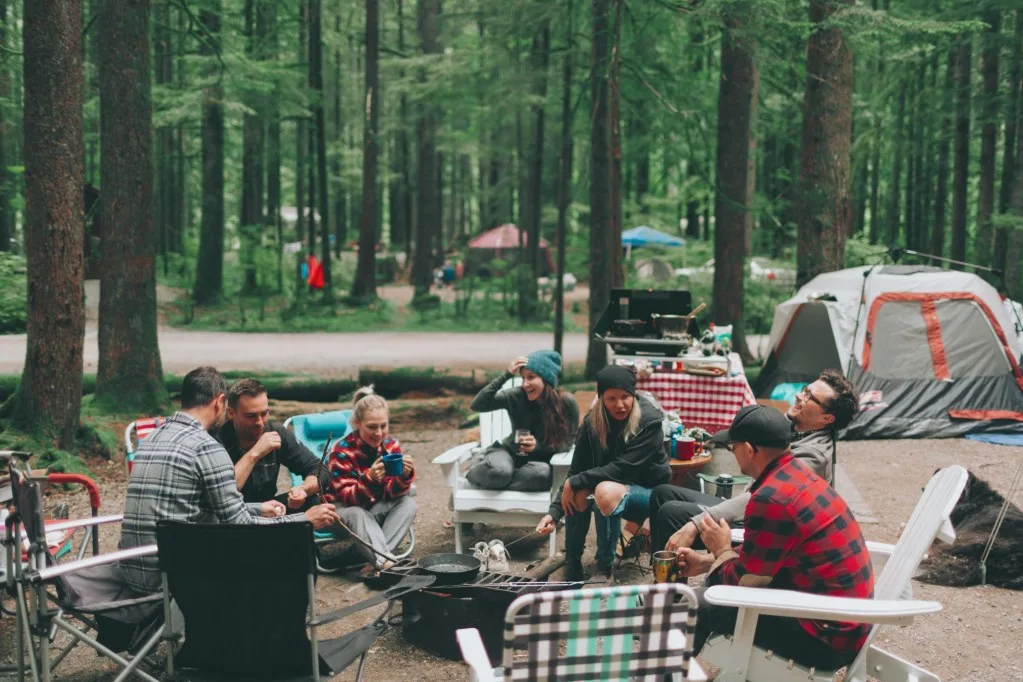Making a camping reservation can be a stressful task. How do you know if it’s a bad campground or the right one for you?
What if it’s in a bad area? Will it have everything they promised on the website? So many questions make you think that maybe you shouldn’t go camping in the first place.
Don’t worry! We’ve got tips and tricks to take the stress out of planning and help you spot the signs of a bad campground, even before you make your reservation.
Let’s dive in!
What Makes A Good Camping Spot?
A good camping spot is one where you feel like you are at home. One that is comfortable, level, and fits your style, whatever that may be. It has everything you need, whether that be all the amenities or none, or somewhere in between.
If other campers are nearby, they are kind and thoughtful and love to wave and say hello. There are dogs that are well behaved and children that play with voices that match the ambiance. Trash is in its proper place. Showers and bathrooms are clean, and spiderwebs are nonexistent.
A good camping spot is one where you feel safe and secure no matter the time of day or night—a place with welcoming hosts and a favorable vibe. And speaking of vibes, you can’t forget about location. A good camping spot is also in the area that supports your desired experiences and lets you get a good night’s sleep.
Knowing what’s right for you is entirely different from actually finding a good camping spot. While a suitable camp spot should be just right for your needs, you’ll rarely find a flawless one. But if you want to find your ideal site, you’ll need to prioritize what’s more important to you.

How Do I Choose A Campground?
Safety and location are two of the most important things to consider when choosing a campground.
Safety because you want to relax when coming home to a campground after a day of exploring and playing. What’s around that dark corner should always be a concern, but it shouldn’t be something that keeps you up at night. So be sure to choose a campground that gives you a sense of security.
Location is essential when choosing a campground. If your goal is to get away from the rest of the world and into nature, choosing a campground near a large city won’t achieve that goal. However, if you seek urban adventures, a campground with easy access to that city may be the best bet.
Other things to consider when choosing a campground are amenities and cost.
Usually, the more amenities, the higher the price. If you want all the amenities, including a hot tub and game room, don’t book a reservation at a campground that only has vault toilets. You’ll also need to be aware that the hot tub may come at a higher cost than you are willing to pay.
And because of that, compromise is vital when choosing a campground. Planning and preparing for your camping trip can help you find a great campground, but you’ll probably never see a perfect spot.
So be flexible and willing to compromise on essential things and let go of things that aren’t. Life isn’t perfect, and more than likely, your campsite won’t be either. But it should at least be good and the ideal one for you.
How to Spot the Signs of a Bad Campground
On that note, we’ve got some signs for you to help you realize if you may be heading towards a bad campground. Planning ahead of time by reading reviews, watching videos, and evaluating customer service are all things you can do to prevent a nightmare camping trip in a bad campground.
Read the Reviews
Take your time and peruse through Google reviews and camping apps. They can give you an idea of what to expect before you even arrive. Take these with a grain of salt, though. One person’s trash is another person’s treasure.
The same goes for a campground. A review might mention how terrible a place was because it had no amenities. That might be precisely what you’re looking for, a place with only nature to keep you company. Another might mention too many cacti, but that campground is in the desert, so cacti are expected.
Reviews might give hosts a bad reputation, and there are times when hosts can be rude and unkind and make your stay far from unacceptable. But there are also times when your host may have just had a bad day. Some reviewers may give an accurate picture of the campground, but others may not. Trust your best judgment.

Drive Through The Campground (Virtually with YouTube Videos)
One way to get a genuine picture of the campground is by driving through it ahead of time if you can. If it’s in total disarray, you might have reason to wonder if this is the place for you. Signs of a bad campground could be trash strewn everywhere or many broken-down RV’s or other vehicles parked on the lot.
Another way to determine whether you’d like to stay or not is to pay attention to how the people react to you and each other. Do you hear a lot of yelling and arguing and loud music, or do you hear a lot of campfire crackles and casual conversations?
If you can’t check out the campground personally, often, you can find YouTube videos on the campground. Do a quick search to see who’s been there before you and what they experienced. This is a great way to experience a place beforehand, so there aren’t any unwanted surprises when you show up anticipating a great camp spot.
Evaluate the Customer Service
First impressions are often correct impressions. When making first contact with the campground staff, take note of the customer service. Was the person friendly and welcoming or gruff and standoffish? Were they helpful when you asked questions or annoyed with you?
Generally, that first meeting or phone call will tell you all you need to know about a campground. But, keep in mind, campground staff are human, too, and have bad days just like the rest of us.
So, if you have a bad experience when you call to make a reservation, it may indicate that the customer service is terrible. But use your judgment, as the person could just be having a bad day.
When Picking A Campsite You Should Avoid What Kinds Of Areas?
To make sure you find a great campsite, be sure to avoid areas that are full of trash and debris. On that same note, you may not want to stay in a campground that seems to have a lot of long-term rentals with campers that are in disarray. While this isn’t an automatic sign of a lousy campsite, it is something that should raise your hackles a bit, especially if you’re looking for a place with a lot of amenities.
If you’re looking for a relaxing and quiet getaway, be sure to avoid campgrounds right on the highway. On the other hand, if you’re looking for easy access to in-town adventures, be sure to avoid remote campgrounds off the beaten path.
And if you’re not sure of a place, or it gives you the heebie-jeebies, or the hosts and neighbors rub you the wrong way, this is the area you should avoid. Trust your gut. If something isn’t feeling right and you can safely leave, then leave. Other campgrounds will give you the sense of safety you desire and deserve.
What’s The Most Important Factor When Looking For A Camping Spot?
When you’re prepared ahead of time and have done the research, your chances of finding that great – if not perfect – campsite increases dramatically. However, whether you’re a planner or not, the most important factor is flexibility when finding that ideal camp spot.
If your standards are set too high, your well-planned camping getaway may turn out to be disastrous when it didn’t have to be. Be flexible in your expectations and learn to go with the flow, as long as your safety isn’t compromised. Some of the best things happen when you’re not expecting them.
Discover the Best Free Camping Across the USA
To be honest with you, we hate paying for camping. There are so many free campsites in America (with complete privacy).
You should give it a try!
As a matter of fact, these free campsites are yours. Every time you pay federal taxes, you’re contributing to these lands.
Become a FREE CAMPING INSIDER and join the 100,000 campers who love to score the best site!
We’ll send you the 50 Best Free Campsites in the USA (one per state). Access the list by submitting your email below:
Picking a campsite!
We try to stay at 55+ campgrounds.
Investigate the comments and rules.
Do they enforce the rules?
Like dogs must be leashed!
Are they?
Breed restrictions, speed limits, basically do they enforce their rules that are on website?
How friendly is management?
People say Hi
Etc,etc.
If so then we will stay there for the season
Have fun and enjoy camping
Some of my best experiences of camping has been stopping at a camp grounds along the highway friendly,clean and quiet. With a touch a neighbor.
Great info. We r newbies and are searching for decent quiet campsites across the country but mostly in the south east
Thank you. I just bought my used tiny camper and as yet have not taken it anywhere but I have a cross country trip in December and your common sense approach to finding a campsite is appreciated.